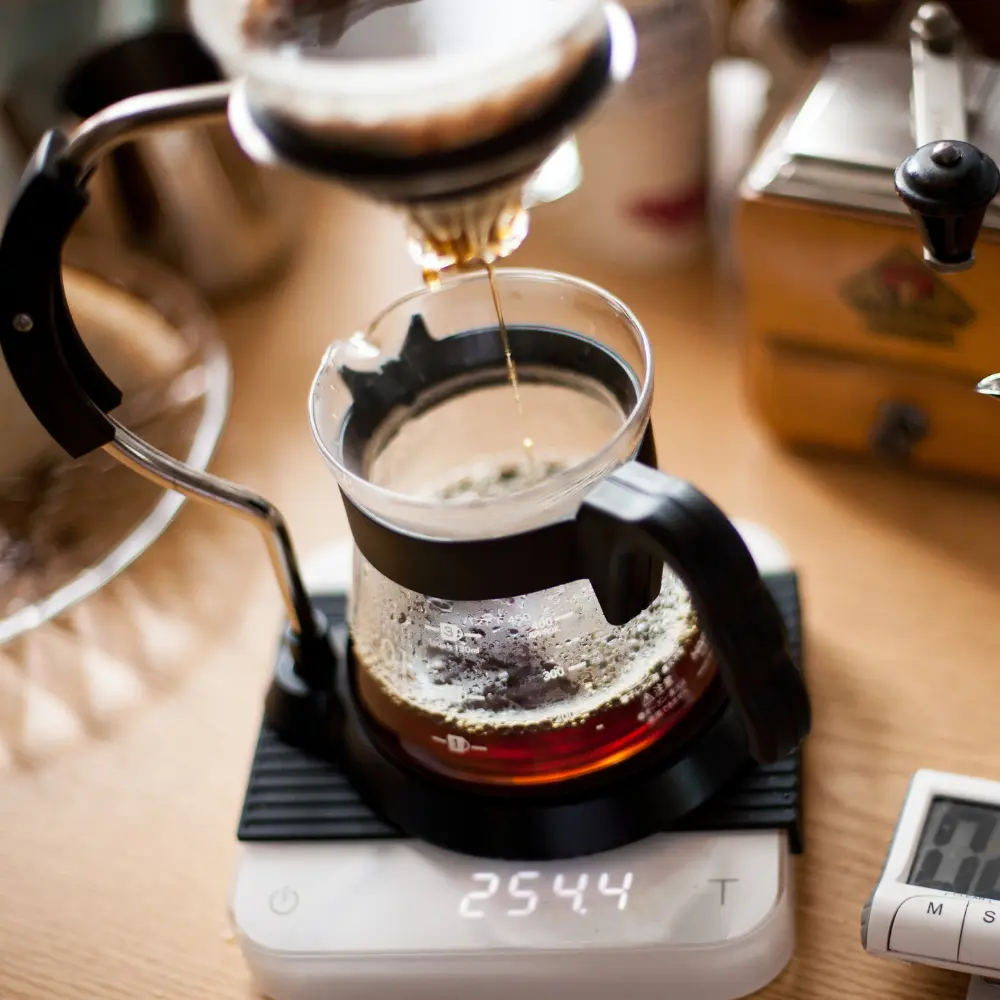Have you ever pondered on the existence of a clandestine formula that could amplify the benefits of your daily coffee routine? Countless individuals across the globe rely on a piping hot cup of java to kickstart their day and propel them through a jam-packed schedule. Nevertheless, did you possess knowledge that the temporal aspect of your coffee consumption could hold a pivotal position in unleashing its complete potential? Welcome to “Best Time to Drink Coffee: Discover Your Perfect Caffeine Moment,” where we shall probe the science underpinning coffee timing and furnish you with invaluable insights to optimize your caffeine intake.
This comprehensive manual delves into the captivating realm of circadian rhythms and cortisol levels, thereby disclosing how they impact your body’s response to caffeine. We encapsulate all the essential components that contribute to the discovery of your idyllic coffee moment, ranging from productivity and energy levels to health advantages and personal factors. So grab hold of your favorite mug, and let us commence on an expedition to unlock the enigma behind your best time to consume coffee!
Best Time to Drink Coffee: Key Takeaway
- To optimize the benefits of coffee, it’s crucial to consider individual factors like circadian rhythm, cortisol levels, genetics, lifestyle, and personal preferences when determining the best time to drink it.
- Aligning coffee consumption with your body’s natural circadian rhythm and cortisol levels can enhance the energizing effects of caffeine while minimizing sleep disruptions.
- Experimentation with different coffee schedules is key to finding the ideal timing for morning coffee drinkers, afternoon slump battlers, and late-night workers.
- In addition to promoting energy and productivity, timing coffee consumption can provide health benefits like maximizing nutrient absorption, and promoting healthy digestion.
- Determining your perfect caffeine moment may require trial and error, paying close attention to your body’s response to caffeine at different times of the day, and adjusting coffee timing to suit your unique needs.
Understanding Your Body’s Circadian Rhythm
The intricate workings of your circadian rhythm serve a pivotal role in determining the optimal moments to indulge in your daily caffeine fix. As a master regulator, this internal timekeeper oversees a plethora of physiological processes such as sleep-wake cycles and caffeine response rates. By gaining a comprehensive understanding of your circadian rhythm, you can make well-informed decisions on when to savor your coffee for maximal benefits.
What is the Circadian Rhythm?

The circadian rhythm, a 24-hour biological chronometer, orchestrates a vast array of bodily functions including sleep patterns, hormone production, and metabolic activity. (1) This complex mechanism is intricately intertwined with environmental factors such as light and temperature, which facilitate adaptation to daily routines. The circadian rhythm functions as a sentinel that dictates feelings of drowsiness, alertness, and hunger, and is an indispensable component of overall health and wellness. Its multifaceted nature renders it a formidable force that demands unwavering attention and scrutiny.
The Intricate Interplay between Coffee and the Circadian Rhythm
The caffeine in coffee is a potent psychoactive substance that operates as a stimulant of the central nervous system by impeding the activity of adenosine, a chemical transmitter that prompts drowsiness. This leads to a surge in attentiveness and a dip in weariness. Nevertheless, consuming coffee during specific hours can disrupt your circadian rhythm and compromise your sleep quality. Imbibing coffee late in the day can trigger difficulties in initiating sleep, fragmented sleep, or even insomnia. (2) Hence, comprehending how coffee modulates your circadian rhythm is paramount to identifying the opportune moment for caffeine consumption.
The Science Unveiled: Decoding the Optimal Time for Sipping Coffee
Embarking on a quest to unravel the scientific underpinnings of coffee consumption can prove rewarding in making the most of your daily caffeine ritual. A panoply of factors, encompassing cortisol levels and caffeine tolerance, are instrumental in delineating the best time to drink coffee. Let’s plunge into the intricacies of these constituents and fathom why coherence in coffee timing is of utmost importance.
The Role of Cortisol in Coffee Consumption

Cortisol, commonly dubbed the “stress hormone,” plays a cardinal role in regulating your body’s response to stress and preserving attentiveness. Its secretion follows a circadian pattern, attaining a zenith in the early morning hours (between 6:00 and 8:00 a.m.) and gradually ebbing as the day progresses. (3) Intake of coffee during intervals of elevated cortisol levels can impede the stimulating properties of caffeine, given that your body is already naturally alert.
The Ideal Time to Savor Coffee Based on Your Rhythm

The opportune moment for indulging in coffee is when cortisol levels nosedive, as in mid-morning (between 9:30 and 11:30 a.m.) and early afternoon (from 1:00 to 3:00 p.m.). This grants you the leverage to maximize the invigorating effects of caffeine and heighten your alertness and efficacy when you need it most. Consistency in aligning coffee consumption with cortisol fluctuations can enhance the efficacy of caffeine and forestall the onset of detrimental effects.
Caffeine Tolerance and Its Effects on Timing
Caffeine tolerance, a physiological phenomenon that manifests when the body becomes less responsive to the invigorating effects of caffeine over time, can have a substantial impact on determining the ideal coffee consumption schedule. This occurs as a result of regular and excessive caffeine intake. When caffeine tolerance sets in, the same level of alertness and concentration may require higher doses of caffeine. Therefore, the optimal time for coffee consumption may vary between individuals with varying levels of caffeine tolerance.
If caffeine tolerance ensues, consider moderating your overall caffeine intake, spreading out your coffee consumption throughout the day, or taking periodic breaks to recalibrate your sensitivity. This can enable you to discover the most fitting timing for your coffee intake.
The Importance of Consistent Coffee Timing
Adhering to a consistent coffee routine can furnish an array of perks. Firstly, it helps balance your body’s response to caffeine and reinforces your circadian rhythm by synchronizing your coffee consumption with your innate energy oscillations. Secondly, it reduces the risk of developing caffeine tolerance, guaranteeing that the intended effects of coffee endure.

To uphold a uniform coffee timetable, endeavor to savor your coffee when cortisol levels are low and shun late-day consumption, which may interfere with your slumber. By adhering to a standardized coffee regime, you can amplify the benefits of caffeine while preserving a healthy circadian rhythm.
Coffee and Productivity: Finding Your Perfect Brew Moment
The optimal timing of coffee consumption can have a momentous influence on your productivity and vitality throughout the day. Whether you’re a dawn enthusiast, struggling with the afternoon slump, or a night owl, unearthing your ideal coffee moment is imperative to leverage your caffeine intake. Let’s probe these different scenarios and unravel how to streamline your coffee regimen.
Morning Coffee: The Key to Jumpstarting Your Day

For myriad individuals, a morning cup of joe is a quintessential routine to galvanize the day. Even though cortisol levels reach their zenith in the early hours, holding off until they start declining (approximately between 9:30 and 11:30 a.m.) can enable you to magnify the stimulating properties of caffeine. By aligning your morning coffee with the natural rhythm of your body, you can amplify your efficacy and concentration during the workday.
The Afternoon Slump: Can Coffee Help?

The notorious mid-day slump, a ubiquitous occurrence for numerous individuals, characterized by a slump in vitality and concentration in the early to mid-afternoon, can be a challenge to tackle. Consuming coffee during this interval (between 1:00 to 3:00 p.m.) can help thwart the slump and rejuvenate your alertness. Nonetheless, bear in mind that drinking coffee too late in the afternoon may impede your slumber, necessitating the need to strike the right balance between sustaining your productivity and safeguarding your rest.
The Late-Night Worker: Balancing Energy and Sleep

For night owls or individuals who require an extra boost to navigate the evening, determining the best times to indulge in coffee can pose a predicament. While caffeine can furnish the requisite vitality to fulfill tasks, it’s imperative not to compromise sleep quality in the process. If you need a nocturnal caffeine pick-me-up, attempt to savor your coffee at least six hours before your desired bedtime. This affords your body adequate time to process the caffeine and diminish its potential impact on your sleep. Moreover, contemplate choosing a smaller serving or a low-caffeine alternative to minimize disturbances to your circadian rhythm.
Health Benefits of Timing Your Coffee Consumption
Apart from heightening productivity and vivacity levels, the optimal timing of coffee consumption can also have a noteworthy impact on your general well-being. By streamlining your coffee regimen, you can minimize sleep disturbances, augment nutrient absorption, and foster healthy digestion. Let’s delve into these health advantages in greater depth.
Reducing Sleep Disruption

The energizing effects of caffeine can last anywhere from 3 to 7 hours, contingent on individual aspects like metabolism and tolerance. (4) Drinking coffee close to bedtime can lead to difficulties in initiating sleep, agitated sleep, or even insomnia. To mitigate the risk of sleep disruption, it’s imperative to regulate the timing of your coffee consumption to prevent it from impeding your natural sleep cycle. Endeavor to consume your final cup of coffee at least six hours before bedtime, ensuring that the majority of caffeine is metabolized before you sleep.
Maximizing Nutrient Absorption

The timing of your coffee consumption can also influence the absorption of specific nutrients, like iron and calcium. Caffeine can impede the absorption of these vital minerals, potentially leading to deficiencies if consumed simultaneously with meals abundant in these nutrients. To optimize nutrient absorption, eschew drinking coffee within an hour before or after consuming meals rich in iron or calcium. By doing so, you can ensure that your body is competently absorbing the nutrients it requires for peak health.
Promoting Healthy Digestion

While coffee is renowned for its ability to invigorate digestion, ingesting it at the wrong time can trigger digestive issues, such as acid reflux or stomach distress. To promote digestive wellness, attempt to avoid consuming coffee on an empty stomach, given that it can escalate stomach acid production and potentially irritate. Rather, enjoy your caffeinated beverage with food or wait at least 30 minutes after eating to relish it. By synchronizing your coffee intake with meals, you can diminish the likelihood of digestive discomfort and bolster a healthy digestive system. (5)
Personalized Coffee Timing: Tailoring to Individual Factors
The best time to drink coffee can fluctuate considerably between individuals, owing to factors such as genetics, lifestyle, and personal inclinations. By comprehending these factors and experimenting with diverse coffee schedules, you can customize your coffee timing to fulfill your distinct requirements and magnify its advantages.
The Role of Genetics in Caffeine Sensitivity
Genetics plays a pivotal role in determining how your body processes and reacts to caffeine. (6) Certain individuals are innately more responsive to caffeine due to discrepancies in genes linked to caffeine metabolism and the adenosine receptor. If you belong to the category with heightened caffeine sensitivity, you may find that consuming coffee later in the day disrupts your sleep or that the energizing properties of caffeine are more potent for you. In contrast, individuals with lower sensitivity may require larger doses of caffeine to experience its benefits. Familiarizing yourself with your genetic predisposition to caffeine sensitivity can facilitate determining the ideal time to drink coffee for your distinctive necessities.
Lifestyle and Coffee Timing: Correlation and Impact

Your daily routine and lifestyle significantly influence determining the optimal time to consume coffee. Factors such as your occupation schedule, exercise routines, and sleep patterns can all impact your ideal coffee timing. For instance, if you work night shifts, your cortisol levels and circadian rhythm may diverge from those who work during the day, impacting your ideal coffee consumption schedule. Moreover, if you exercise regularly, you may find that drinking coffee before your workout boosts your performance and energy levels. Contemplate your everyday routine and personal inclinations when establishing the best coffee schedule for your lifestyle.
Trial and Error: Unveiling Your Perfect Coffee Schedule
In the end, discovering the best time to drink coffee for your unique requirements necessitates some experimentation. Try out different coffee schedules, observing how each one influences your energy, productivity, and sleep quality. Pay close attention to how your body reacts to caffeine at various intervals throughout the day and tailor your coffee timing accordingly. Gradually, you’ll be capable of refining your coffee schedule to maximize its benefits and ensure it aligns with your specific requirements and preferences.
Conclusion
In conclusion, the best time to drink coffee is an extremely personalized process that hinges on elements such as your circadian rhythm, cortisol levels, genetics, lifestyle, and personal preferences. By comprehending the science underlying coffee consumption and observing how your body reacts to caffeine, you can optimize your coffee timing for maximal energy, productivity, and overall health advantages.
Recall that the perfect moment for caffeine differs from individual to individual, so don’t be hesitant to explore diverse coffee schedules and refine your routine to correspond to your unique requirements. With some experimentation, you’ll be well on your way to discovering your perfect coffee timing and making the most of your daily dose of Java. So, let’s raise our mugs to the pursuit of the best time to drink coffee, and savor the expedition towards our ultimate caffeine moment!
FAQ
How can I find my own perfect time to drink coffee?
When determining the optimal time for consuming coffee, it's worthwhile to consider several factors, such as one's preferences, circadian rhythm, genetics, cortisol levels, and lifestyle. Ascertaining how your body responds to caffeine at various times of the day and experimenting with different coffee consumption schedules can aid in fine-tuning your coffee timing to best suit your distinctive requirements.
Does the type of coffee I drink affect the best time to consume it?
The timing for drinking coffee may be impacted by the coffee variety consumed, primarily due to the varying caffeine contents in various coffee varieties. For example, a robust, dark roast, or espresso is likely to contain higher caffeine levels than decaf or light roast coffee. If one is sensitive to caffeine, it may be advisable to consume lower-caffeine alternatives later in the day to minimize the likelihood of sleep disturbances.
Can drinking coffee too late in the day impact my sleep quality?
Drinking coffee late in the day may have a detrimental impact on sleep quality. Caffeine is a central nervous system stimulant that obstructs the sleep-inducing neurotransmitter adenosine, which may result in issues with falling asleep, fragmented sleep, or insomnia. To minimize the risk of sleep disturbances, it's recommended to consume the final cup of coffee at least six hours before going to bed.
How does caffeine tolerance affect the best time to drink coffee?
Caffeine tolerance refers to the decreased sensitivity of the body to caffeine's stimulatory effects due to frequent and excessive consumption. When tolerance develops, higher caffeine doses may be required to achieve the same degree of focus and alertness. Consequently, the optimal time for coffee consumption for individuals with high caffeine tolerance may differ from those with low tolerance. If caffeine tolerance is present, one may consider reducing their caffeine intake, spacing out coffee consumption throughout the day, or taking occasional breaks to reset their sensitivity.














